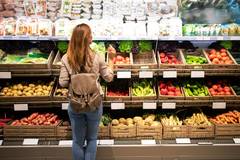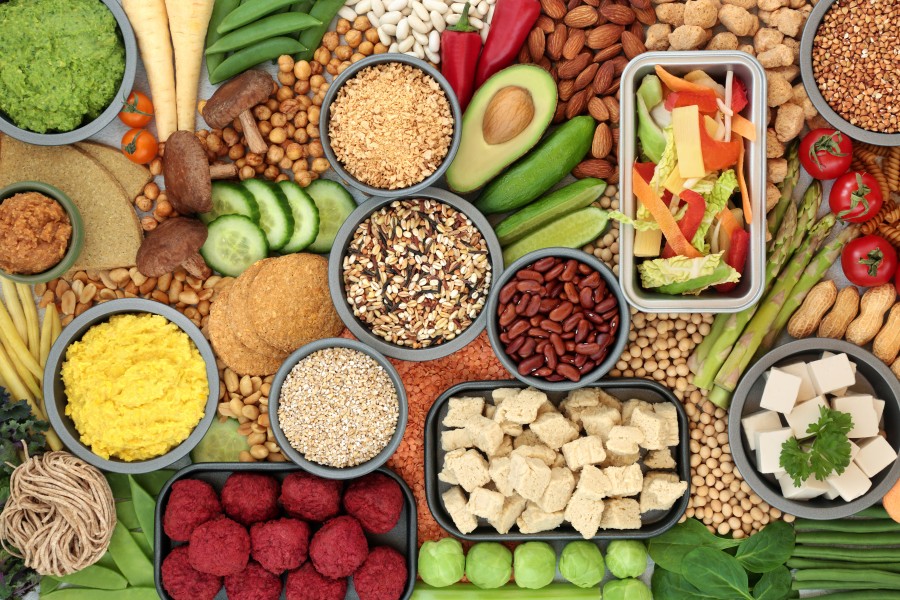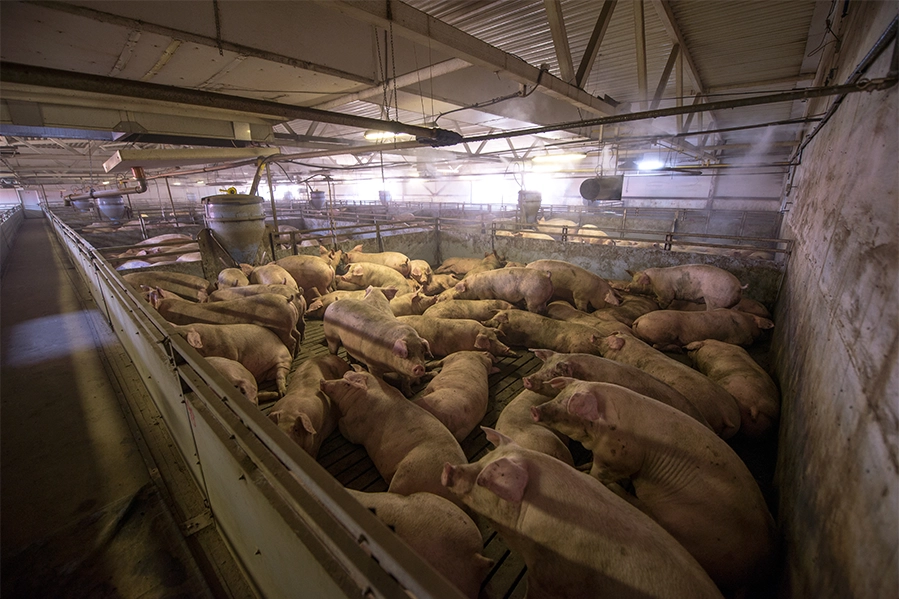
- Industry news
Industry news
- Category news
Category news
- Reports
- Key trends
- Multimedia
- Journal
- Events
- Suppliers
- Home
- Industry news
Industry news
- Category news
Category news
- Reports
- Key trends
- Multimedia
- Events
- Suppliers
EAT-Lancet Commission urges overhaul of global diets and food policy
Key takeaways
- The updated EAT-Lancet report urges a shift toward plant-based diets with more whole foods and significantly less meat, dairy, and fish to promote both human and planetary health.
- Food systems are breaching key planetary boundaries, contributing to climate change and ecological degradation.
- Global momentum is building for policy, retail, and institutional reforms, such as plant-based school meals and retailer protein targets.

The latest updates to the EAT-Lancet Planetary Health Diet reaffirm the paramount importance of plant-based foods rich in whole grains, nuts, vegetables, fruits, and legumes, while signaling a need to eat less meat, fish, and dairy.
The report, recently launched at the EAT Stockholm Food Forum, is said to provide the most comprehensive global scientific evaluation of food systems to date. It flags a common shortfall in consumption of plant-based foods across all regions and notably advocates less focus on animal-based protein for health and environmental reasons.
Shifting global diets could prevent up to 15 million premature deaths per year, while food systems — which currently account for around 30% of total GHG emissions globally — are the largest contributor to the transgression of five planetary boundaries, according to the report. Transforming food systems could cut these emissions by more than half.
Moreover, the report flags that fewer than 1% of the world’s population is currently in the “safe and just space,” where people’s food needs are met within planetary boundaries. Meanwhile, the wealthiest 30% of people drive more than 70% of food-related environmental impacts, and 32% of food systems workers earn below a living wage.
The updates build on a 2019 report, and under the new Commission — including leading international experts in nutrition, climate, economics, health, social sciences, and agriculture from more than 35 countries — they go further than before regarding plant-based diets and a move away from animal protein.
Pushing planetary limits
The report also warns that current food systems are breaching planetary limits, flagging that food systems are pushing temperatures beyond 1.5° Celsius, and this wouldn’t change even if there were a complete transition away from fossil fuels.
The planetary boundaries framework defines nine key Earth system processes that regulate life on Earth. The world has already passed six of these nine boundaries: climate, biodiversity, land, freshwater, nitrogen and phosphorus pollution, and novel entities (pesticides, antimicrobials, and microplastics). Food systems are the largest contributor to five of these transgressions.
Speaking to Food Ingredients First, Anna-Lena Klapp, head of research at ProVeg International, examines how the updated Planetary Health Diet will influence product development and reformulation strategies for food manufacturers in the next 5–10 years. The organization welcomes the latest updates to the Planetary Health Diet.
“It is clear there is still much work to be done to ensure countries incorporate the recommendations of this diet into their national dietary guidelines, together with an effective implementation strategy,” says Klapp.
“We expect to see the trend toward more hybrid meat products continue, where a higher percentage of plant-based protein is added to traditional, animal-based products such as sausages to support the transition to more plant-rich diets.”
“Retailers and foodservice providers are already playing a leading role in supporting a transition to plant-based protein, with some supermarket chains actively increasing their percentage of plant protein on the shelves. For example, Lidl became the first retailer in the UK last year to set a protein split target. The company is aiming to ensure that plant-based protein sales (in tonnage) account for 25% of its total protein sales by 2030.” The report flags a common shortfall in consumption of plant-based foods across all regions an advocates less focus on animal-based protein for health and environmental reasons.
The report flags a common shortfall in consumption of plant-based foods across all regions an advocates less focus on animal-based protein for health and environmental reasons.
Shaping food environments
Klapp also flags two initiatives as examples of how food environments can be shaped in several different ways to facilitate healthy and sustainable choices.
“We’re now seeing more investment in plant protein by governments such as Germany and the UK. These initiatives will bear fruit and help society shift to more plant-forward food environments. The European Commission is also being called upon to draw up a comprehensive Action Plan for Plant Based Foods, similar to the one pioneered by Denmark. This will be tremendously helpful in facilitating greater production and consumption of plant-based foods.”
A good example is the Protein Tracker in the Netherlands, which is guided by the Planetary Health Diet. It sets targets for retailers to increase the amount of plant-based protein on their shelves. The School Plates program in the UK has also introduced more plant-based foods into schools.
“The School Plates program continues to go from strength to strength, having now swapped 60 million school meals from animal-based to plant-rich since the program began. Free materials explaining how to implement the interventions of the program are available to download, together with recipes and lesson plans for teachers, enabling anyone anywhere to apply and adapt the tried and tested principles in their own setting,” says Klapp.
“Through its Global Plant-Based School Food Network, ProVeg brings together almost 100 organizations from over 50 countries to share learnings, successes, and challenges to accelerate the pace of change in school food globally.”
“There are many more models for dietary change already being launched or running around the world. For example, four major hospitals in Lisbon, Portugal, are offering more plant-based meals in hospitals in a partnership with ProVeg Portugal.”
Klapp also mentions how New York City has introduced Meatless Mondays and Plant Powered Fridays to its schools.
“In all 11 public hospitals in the city, plant-based meals are the default options for patients. New York City is also using US$44 million from the American College of Lifestyle Medicine to train 200,000 healthcare professionals in plant-based nutrition. In August, the City Health Department and the Mayor’s Office of Food Policy announced plans to ban processed meats in public schools and hospitals.” The report warns that food systems are pushing temperatures beyond 1.5° Celsius, and this wouldn’t change even if fossil fuels were eradicated.
The report warns that food systems are pushing temperatures beyond 1.5° Celsius, and this wouldn’t change even if fossil fuels were eradicated.
What are national dietary guidelines lacking?
ProVeg International calls for clearer inclusion of plant-based alternatives in national dietary guidelines. What scientific or regulatory frameworks are missing that could support this transition?
“Healthy, sustainable plant-based diets should primarily focus on whole foods, including a variety of fruits, vegetables, grains, nuts, seeds, and legumes. However, transitioning from a meat-and-dairy-focused diet to a plant-based one can be facilitated by including nutritious plant-based alternatives that mimic the taste and texture of animal-based products,” Klapp tells us
“These alternatives — ranging from traditional foods like tofu, soy milk, and seitan to novel options such as pea-protein meatballs or nut-based cheeses — make dietary shifts more practical and appealing while supporting nutrient intake and reducing environmental impact.”
Despite growing evidence of their health and environmental benefits, national dietary guidelines often address plant-based alternatives inconsistently. Key gaps remain in both scientific and regulatory frameworks. Not all products are nutritionally equivalent: some contain high levels of salt, sugar, or saturated fat, and fortification with nutrients like calcium, iodine, and vitamin B12 is uneven.
“Guidelines that provide clear recommendations on prioritizing fortified products and complementing potential nutrient gaps through diet or supplements could help consumers make informed choices,” explains Klapp.
“Some countries already provide useful models. Germany’s position paper on plant-based milk guides consumers on fortified options, while the Netherlands sets clear nutrient standards for plant-based meat and dairy alternatives. Furthermore, existing food classification systems, which often group all ultra-processed foods as unhealthy, risk discouraging the consumption of plant-based alternatives that are nutritionally valuable.”
“Guidelines that balance processing concerns with overall nutritional quality and environmental impact would be more effective in supporting dietary transitions. In short, clearer inclusion of plant-based alternatives in dietary guidelines — combined with nutrient standards, fortification guidance, and nuanced assessment of processing — would provide a strong scientific and regulatory framework to help people shift toward healthier, more sustainable diets,” she concludes.











